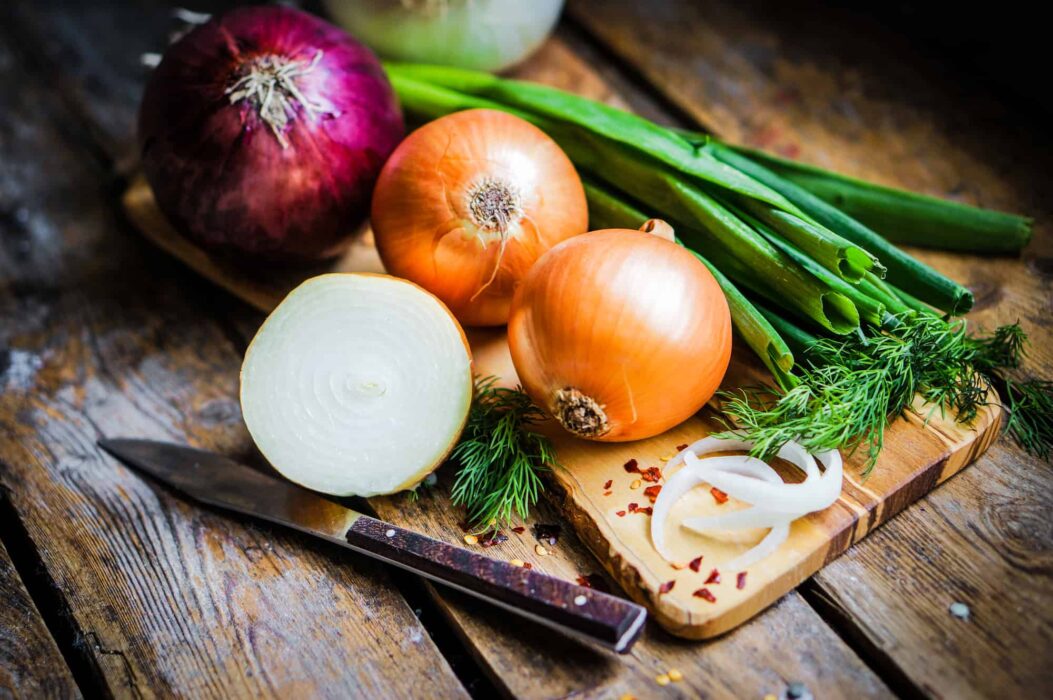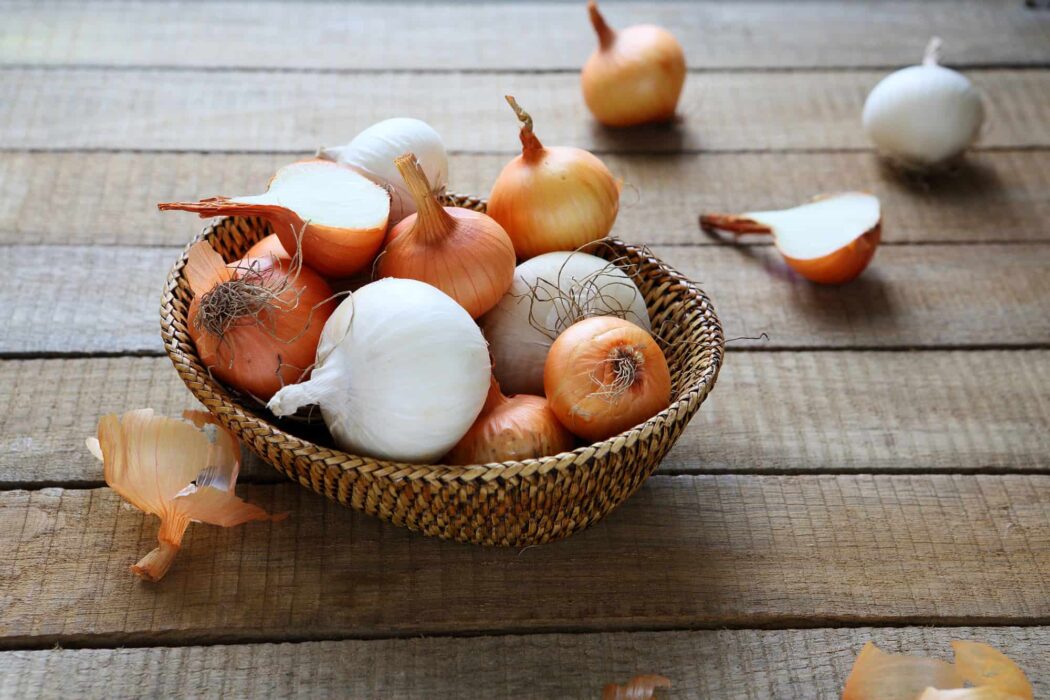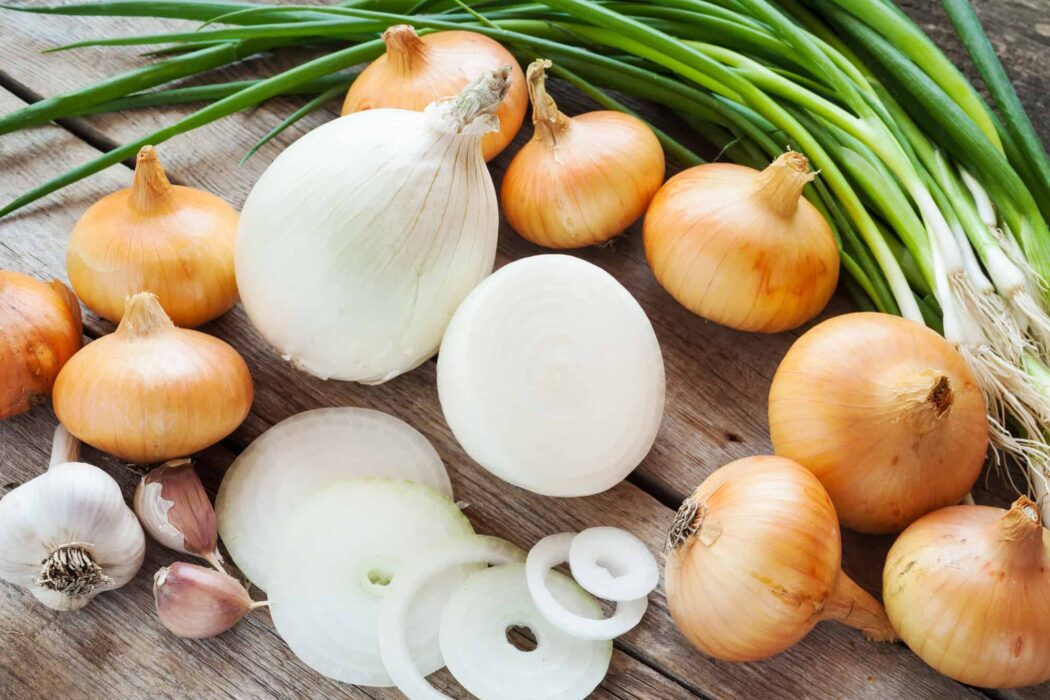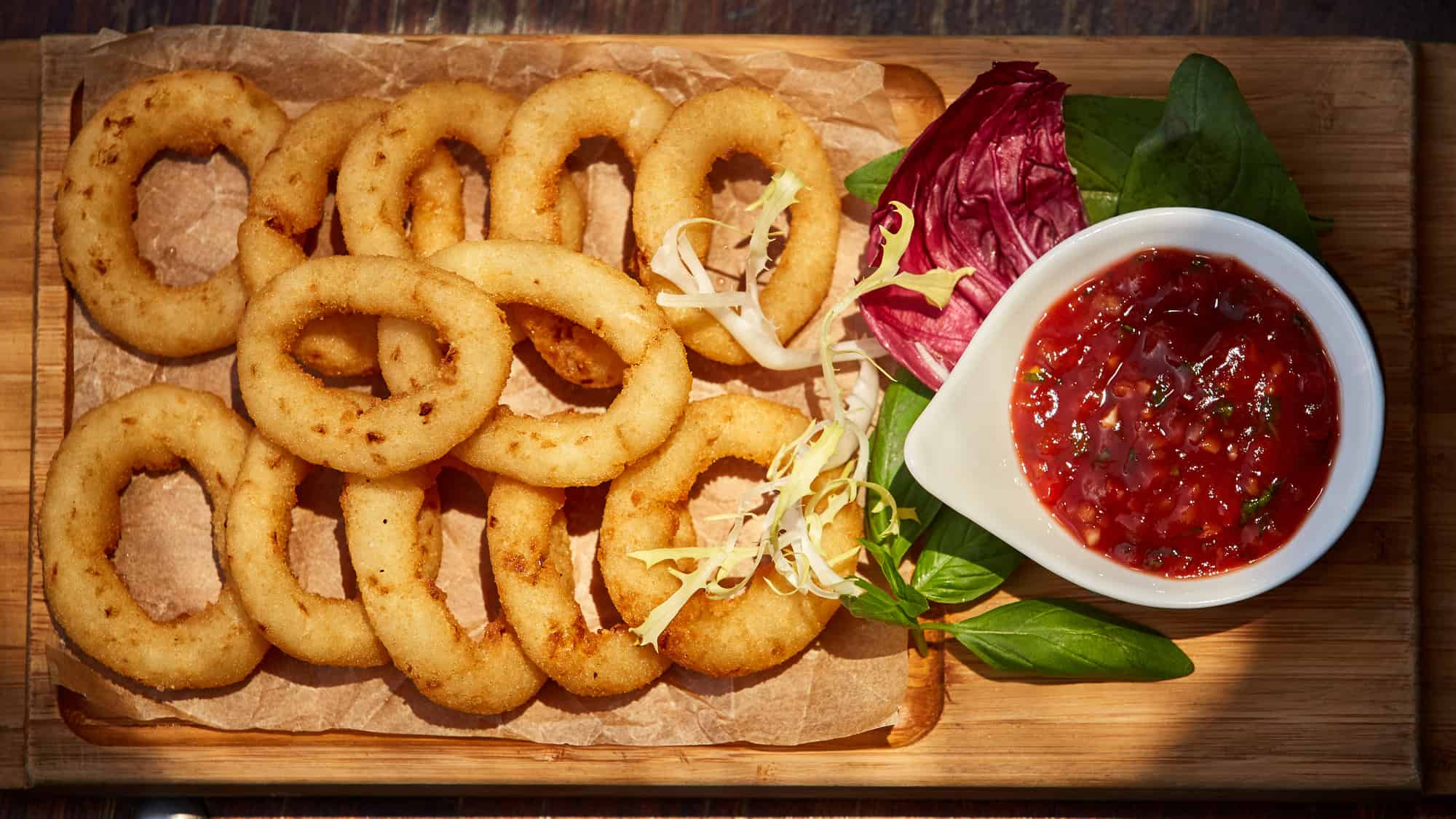Contrary to common misconceptions, the keto diet is rich in vegetables more than some other diets. Yes, it allows you to eat up to 20 grams of net carbs per day. Still, it’s actually a huge amount of green leafy vegetables, tomatoes, bell peppers, jicama, and even some keto fruits. What’s more, eating vegetables on keto is essential for good motility, overall health, and nutritious weight loss. So, you can diversify your keto menu by adding different vegetables. For example, are onions suitable for a low-carb nutritional plan? Is onion keto?
Yes, onions are good for a low-carb diet in small amounts. It contains moderate amounts of carbohydrates and will not disrupt your ketosis under certain conditions. And while onions are keto, you should add them to your menu after completing your keto adaptation if your goal is losing weight on keto.

How many carbs are in onions? What are the health benefits of onions during the keto diet? I’ll tell you everything about eating onions during the keto diet in this article. Keep reading to find out more!
What is an Onion?
Onions are a kind of biennial and perennial herbaceous plants belonging to the subfamily onions, which are edible and decorative. There are more than a thousand species in the world, the most popular of which are:
- White onion
- Yellow Onion
- Red Onion
- Leek
- Shallot
- Green onions, etc.
Onions are known for their ability to cause watery eyes. It happens when plant cells are damaged, and a substance released irritates the eye’s mucous membrane. The vapors dissolve in the lacrimal glands, forming low concentration sulfuric acid. It cannot harm you, but it causes a lot of unpleasant sensations. It is believed that professional chefs do not cry when slicing onions because they use a sharp blade and work as quickly as possible. Thin slicing allows fewer onion cells to be damaged.
You can also reduce this unpleasant effect by pre-chilling the onion in the refrigerator to slow down the chemical reaction. You should rinse the knife and onion, rinsing off the aggressive substance. The Japanese have solved the problem – after 20 years of work, they have developed an onion variety that does not provoke tears. Now almost half of the world’s production of this vegetable comes from China and India.
Onions can be eaten raw, pickled, or added to any dish. It goes well with vegetables, meats, baked goods, and even desserts. Some dishes are almost entirely composed of onions since this vegetable is delicious on its own. Onions are more bitter and spicy and sometimes sweet, depending on the variety.
Is Onion Keto?
So, onions are not green leafy vegetables allowed without restrictions during the keto diet. Is onion keto? Can you add it to your low-carb nutritional plan?
100 grams of onions (depending on the type) contain:
- 40-50 calories
- 1 grams of protein
- 1 grams of fat
- 4-5 grams of carbohydrates
- 1-2 grams of fiber
- 3-4 grams of net carbs.
Based on this information, we can say that onions are keto-friendly in small quantities, and you can add one large onion to your daily keto menu. I use onions in salads, and keto soups, bake them with meat, and even use them in some keto desserts.

Onion Health Benefits
The chemical composition of onions depends on the variety, storage conditions, periods, and place of growth. The most popular onions contain essential oils, vitamins B1, B2, B6, PP, E, and a large amount of vitamin C. In addition, it is rich in glycosides, protein, carotene, flavonoids, calcium, chlorine, sulfur, potassium, sodium, magnesium, phosphorus, and iron.
Green onions contain proteins, carbohydrates, vitamins A, B9, C, E, potassium, calcium, magnesium, sodium, phosphorus, iron, cobalt, manganese, copper, and molybdenum. Leek contains vitamins C, K, E, B1, B2, PP, iron, manganese, copper, phosphorus, magnesium, calcium, etc.
Red onion contains a lot of B vitamins and manganese, copper, potassium, and phosphorus. In addition to vitamins, onions are rich in mineral salts. They normalize the water-salt balance. The taste and smell of onions and the dietary fiber in them increase the appetite and stimulate digestion, and peristalsis, which is useful for reducing bloating, poor appetite, constipation, and weakness.
Onions contain plant compounds phytoncides, which have a bactericidal effect. They inhibit the growth of bacteria and fungi, help fight infections and stimulate the immune system. It is a fresh, not processed vegetable that has this effect.
Also, fresh onion thins the blood, lowers the level of “bad” cholesterol, increases the elasticity of blood vessels, and lowers blood pressure. All this has a positive effect on the cardiovascular system.
Scientists have also tested onions for antioxidant properties [1]. Extract of compounds from onions – phenols and anthocyanins, can reduce the level of oxidation, and protect red blood cells from oxidative stress. Let’s take a closer look at different kinds of onions and their health benefits.

White Onion
Thanks to the mineral salts in the composition of white onions, it normalizes the water-salt balance, vitamins and other substances important for the body have a bactericidal effect, help fight infections and stimulate the immune system. It also has antioxidant properties, protecting blood cells from oxidative stress. However, the harm of onions lies in the irritating effect on the gastrointestinal tract, which can provoke an exacerbation of peptic ulcer disease, gastritis, pancreatitis, and colitis.
Green Onion
Green onions contain vitamin A, which has a beneficial effect on general well-being, improves the condition of the skin, hair, and nails, slows down the aging process in the body, and prevents the deterioration of vision. It also contains a lot of vitamin C, which is useful during vitamin deficiency and the rise of infectious diseases. The white onion improves the immune system and helps to cope with ailments quickly. In addition, the use of fresh onions reduces the risk of tooth decay and decontaminates the oral cavity. At the same time, excessive consumption of onions can be harmful and increase the acidity of the stomach, and irritate the respiratory organs. It is contraindicated for those with asthma, and liver and kidney disease.
Carbs in Cucumbers: Are Cucumbers Good for Keto?
Red Onion
Red onions contain B vitamins, vitamins C, A, as well as potassium, zinc, iodine, iron, magnesium, copper, etc. Due to its rich composition, the vegetable has an immunomodulatory, bactericidal, antifungal effect, protects against the formation of blood clots [2], thins the blood, and is able to balance sugar levels. However, red onions can harm people with severe liver dysfunctions, individual intolerance, and stomach diseases.

Leek
Leeks should be added to the diet for those who lead a healthy lifestyle. It is especially useful during the period of cold and flu. It helps fight anxiety, depression, nervous exhaustion, and vitamin deficiency. Among the diseases in which it may be useful are gout, rheumatism, atherosclerosis, heart and vascular problems. Contraindications to the use of leek are kidney stones, diseases of the stomach and duodenum, and allergy to nickel.
Shallot
Shallot contains antioxidants that rejuvenate the body. It has an anti-cancer effect [3] and stimulates tissue regeneration. Also, this type of onion fights inflammatory processes, has an antiviral effect, has a beneficial effect on the digestive system, improves metabolism, saturates with vitamins and minerals, and cleanses the body from toxins. It should not be consumed by people with gastrointestinal problems – gastritis, ulcers, colitis, pancreatitis. It can harm those with asthma and hypertension, and the increase in acidity can cause stomach upset.
Yellow Onion
Like other onions, the yellow variety is a good antiseptic that eliminates harmful microorganisms during colds, wounds, and purulent disorders. Regular consumption of yellow onions improves the appearance of the skin, evens out its tone, and prevents aging due to antioxidants [4]. Also, this type of onion restores hair structure, activates hair growth thanks to vitamin A, lowers blood sugar levels, increases acidity, and therefore stimulates digestion. At the same time, high acidity can also cause unpleasant symptoms – heartburn, diarrhea, and vomiting, so yellow onion is not good for people with gastrointestinal diseases. It also cannot be eaten with liver dysfunction.

Contraindications to Onion
Raw onions are considered the most beneficial for the human body because, during heat treatment, many important substances are lost. It should be consumed to improve well-being and saturation of the body with essential vitamins and other substances. Onion helps to activate metabolic processes, cleanse toxins, protect against influenza and severe acute respiratory syndrome [5], and give energy. It is used in cooking and cosmetology to improve skin conditions or accelerate hair growth.
How to Calculate Net Carbs on Keto? Everything You Need to Know to Do It Right
However, you should not consume too much of it not to cause an upset stomach. It is contraindicated in case of liver damage, ulcers, kidney problems, etc. Onions in large quantities are contraindicated in exacerbation of gastric ulcer and duodenal ulcer, pancreatitis, colitis due to irritating effect and increased motor and secretory function of the gastrointestinal tract. If there is a risk of side effects, consult your doctor before taking it.
Yummy Bonus: Keto Onion Rings
This snack is keto and has about 3 net carbs per 5 rings. Flaxseed flour is an excellent alternative for low-carb baking and is healthy for keto snacks. One cup of these onion rings contains about 3 grams of net carbs, 1 gram of protein, and 1 gram of fat.
Ingredients
- 3 large white onions
- 1 egg
- 130 g of flaxseed flour
- 100 g grated cheese
- Spices and salt to taste.
Preparation
- Preheat the oven to 380 degrees
- Peel the onions and cut them into large rings.
- Mix the flour, cheese, and spices in one bowl and break the egg into another.
- Dip the onion rings in an egg and then in the flour mix.
- Place the rings on a baking sheet covered with baking paper.
- Bake them in the oven for 15-20 minutes until golden brown and crispy.
Enjoy keto onion rings with any keto tomato sauce you like.
Conclusion
So, in conclusion, I can say that onions are keto in limited quantities. You can add it as a seasoning to main dishes, bake, stew, or eat it raw in salads. However, you should add onions to your keto diet after finishing your keto adaptation not to ruin your daily carbohydrate intake.
Need Keto Motivation? The Best Tips for Your Keto Lifestyle
You can eat onions raw, pickled, added to any dishes, baked, stewed, and boiled. In addition, it goes well with vegetables, meats, baked goods, fish, and different keto snacks. So try adding onions to your keto menu and diversify your healthy diet!
Sources:
- Sidhu JS, Ali M, Al-Rashdan A, Ahmed N. Onion (Allium cepa L.) is potentially a good source of important antioxidants. J Food Sci Technol. 2019;56(4):1811-1819. (doi:10.1007/s13197-019-03625-9)
- Nagda KK, Ganeriwal SK, Nagda KC, Diwan AM. Effect of onion and garlic on blood coagulation and fibrinolysis in vitro. Indian J Physiol Pharmacol. 1983 Apr-Jun;27(2):141-5. (PMID: 6885127)
- Mohammadi-Motlagh HR, Mostafaie A, Mansouri K. Anticancer and anti-inflammatory activities of shallot (Allium ascalonicum) extract. Arch Med Sci. 2011;7(1):38-44. (doi:10.5114/aoms.2011.20602)
- Marefati N, Ghorani V, Shakeri F, et al. A review of anti-inflammatory, antioxidant, and immunomodulatory effects of Allium cepa and its main constituents. Pharm Biol. 2021;59(1):287-302. (doi:10.1080/13880209.2021.1874028)
- Beigoli S, Behrouz S, Memar Zia A, et al. Effects of Allium cepa and Its Constituents on Respiratory and Allergic Disorders: A Comprehensive Review of Experimental and Clinical Evidence. Evid Based Complement Alternat Med. 2021;2021:5554259. Published 2021 Sep 11. (doi:10.1155/2021/5554259)
